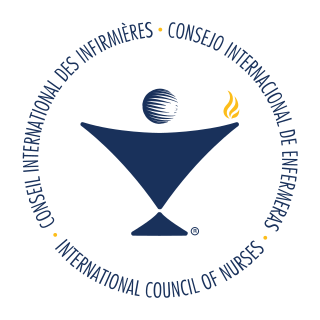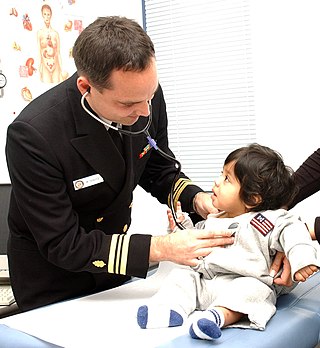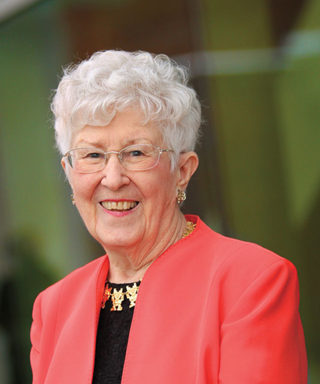
A registered nurse (RN) is a nurse who has graduated or successfully passed a nursing program from a recognized nursing school and met the requirements outlined by a country, state, province or similar government-authorized licensing body to obtain a nursing license. An RN's scope of practice is determined by legislation, and is regulated by a professional body or council.
A Physician Assistant or Physician Associate (PA) is a type of healthcare professional. While these job titles are used internationally, there is significant variation in training and scope of practice from country to country, and sometimes between smaller jurisdictions such as states or provinces. Depending on location, PAs practice semi-autonomously under the supervision of a physician, or autonomously perform a subset of medical services classically provided by physicians.

Primary care is a model of care that supports first-contact, accessible, continuous, comprehensive and coordinated person-focused care. It aims to optimise population health and reduce disparities across the population by ensuring that subgroups have equal access to services.
The American Nurses Association (ANA) is a 501(c)(6) professional organization to advance and protect the profession of nursing. It started in 1896 as the Nurses Associated Alumnae and was renamed the American Nurses Association in 1911. It is based in Silver Spring, Maryland and Jennifer Mensik Kennedy is the current president.
The National Association of Orthopaedic Nurses (NAON) is an American non-profit volunteer-run professional association that aims to advance orthopaedic nursing. Formed in 1980, NAON was designed to promote the highest standards of nursing practice by educating its practitioners, promoting research, and encouraging effective communication between orthopaedic nurses and other groups with similar interests.

The International Council of Nurses (ICN) is a federation of more than 130 national nurses associations. It was founded in 1899 and was the first international organization for health care professionals. It is headquartered in Geneva, Switzerland.

A nurse practitioner (NP) is an advanced practice registered nurse and a type of mid-level practitioner. NPs are trained to assess patient needs, order and interpret diagnostic and laboratory tests, diagnose disease, prescribe medications and formulate treatment plans. NP training covers basic disease prevention, coordination of care, and health promotion.
An advanced practice nurse (APN) is a nurse with post-graduate education and training in nursing. Nurses practicing at this level may work in either a specialist or generalist capacity. APNs are prepared with advanced didactic and clinical education, knowledge, skills, and scope of practice in nursing.
The Canadian Federation of Nurses Unions is a trade union centre in Canada. The CFNU is a federation of provincial unions representing nurses, nurse practitioners, student nurses, and various allied health care workers. It advocates on a national level for issues related to nurses, patient care, the health care system, and working conditions. As of 2023, the CNFU represents nearly 250,000 nurses and student nurses across Canada, who are members of the nine provincial nurses unions and Canadian Nursing Students’ Association.
Health advocacy or health activism encompasses direct service to the individual or family as well as activities that promote health and access to health care in communities and the larger public. Advocates support and promote the rights of the patient in the health care arena, help build capacity to improve community health and enhance health policy initiatives focused on available, safe and quality care. Health advocates are best suited to address the challenge of patient-centered care in our complex healthcare system. The Institute of Medicine (IOM) defines patient-centered care as: Health care that establishes a partnership among practitioners, patients, and their families to ensure that decisions respect patients' wants, needs, and preferences and that patients have the education and support they need to make decisions and participate in their own care. Patient-centered care is also one of the overreaching goals of health advocacy, in addition to safer medical systems, and greater patient involvement in healthcare delivery and design.
In the United States, a psychiatric-mental health nurse practitioner (PMHNP) is an advanced practice registered nurse trained to provide a wide range of mental health services to patients and families in a variety of settings. PMHNPs diagnose, conduct therapy, and prescribe medications for patients who have psychiatric disorders, medical organic brain disorders or substance abuse problems. They are licensed to provide emergency psychiatric services, psychosocial and physical assessments of their patients, treatment plans, and manage patient care. They may also serve as consultants or as educators for families and staff. The PMHNP has a focus on psychiatric diagnosis, including the differential diagnosis of medical disorders with psychiatric symptoms, and on medication treatment for psychiatric disorders.

The American College of Osteopathic Family Physicians (ACOFP) is a professional association and a medical specialty college in the United States. Its membership consists of osteopathic physicians who practice family medicine, residents and medical students. ACOFP is closely affiliated with the American Osteopathic Association and is the osteopathic equivalent of the American Academy of Family Physicians. Much of the association's activities involve addressing the chronic shortage of family practitioners in the United States. It is responsible for setting the standards for the inspection of osteopathic graduate medical education programs in family practice.

National Nurses United (NNU) is the largest organization of registered nurses in the United States. With more than 225,000 members, it is the farthest-reaching union and professional association of registered nurses in the U.S. Founded in 2009 through the merging of the California Nurses Association/National Nurses Organizing Committee, the United American Nurses, and the Massachusetts Nurses Association, the NNU focuses on amplifying the voice of direct care RNs and patients in national policy. The union's policy positions include the enactment of safe nurse-to-patient ratios, patient advocacy rights at the Executive and State level, and legislation for single-payer health care to secure "quality healthcare for all, as a human right." The organization's goal is to "organize all direct care RNs into a single organization capable of exercising influence over the healthcare industry, governments, and employers."

Physicians are an important part of health care in the United States. The vast majority of physicians in the US have a Doctor of Medicine (MD) degree, though some have a Doctor of Osteopathic Medicine (DO), or Bachelor of Medicine, Bachelor of Surgery (MBBS).

Loretta C. Ford is an American nurse and the co-founder of the first nurse practitioner program. Along with pediatrician Henry Silver, Ford started the pediatric nurse practitioner program at the University of Colorado in 1965. In 1972, Ford joined the University of Rochester as founding dean of the nursing school.
An adult-gerontology nurse practitioner (AGNP) is a nurse practitioner that specializes in continuing and comprehensive healthcare for adults across the lifespan from adolescence to old age.
Advanced practice registered nurses (APRNs) are registered nurses with graduate degrees in nursing. APRN roles include: certified nurse midwife, clinical nurse specialist, certified registered nurse anesthetist, and nurse practitioner. APRNs assess, diagnose, manage patient medical problems, order diagnostic tests, and prescribe medications. Rules, regulations, and credentialing for APRNs vary by state. This page outlines the regulatory processes for nurse practitioners in Wisconsin, including education, certification, licensing, and credentialing. Regulatory and credentialing processes are continuously changing, and the information contained on this page is current as of November 2015.
An acute care nurse practitioner (ACNP) is a registered nurse who has completed an accredited graduate-level educational program that prepares them as a nurse practitioner. This program includes supervised clinical practice to acquire advanced knowledge, skills, and abilities. This education and training qualifies them to independently: (1) perform comprehensive health assessments; (2) order and interpret the full spectrum of diagnostic tests and procedures; (3) use a differential diagnosis to reach a medical diagnosis; and (4) order, provide, and evaluate the outcomes of interventions. The purpose of the ACNP is to provide advanced nursing care across the continuum of health care services to meet the specialized physiologic and psychological needs of patients with acute, critical, and/or complex chronic health conditions. This care is continuous and comprehensive and may be provided in any setting where the patient may be found. The ACNP is a licensed independent practitioner and may autonomously provide care. Whenever appropriate, the ACNP considers formal consultation and/or collaboration involving patients, caregivers, nurses, physicians, and other members of the interprofessional team.

The American College of Nurse-Midwives (ACNM) is a professional association in the United States, formed in 1955, that represents certified nurse-midwives (CNMs) and certified midwives (CMs). Dating back to 1929, ACNM strives to be a leading example for excellence in midwifery education and practice in the United States and has a special interest in promoting global health in developing countries. "Members are primary care providers for women throughout the lifespan, with a special emphasis on pregnancy, childbirth, and gynecologic and reproductive health. ACNM reviews research, administers and promotes continuing education programs, and works with organizations, state and federal agencies, and members of Congress to advance the well-being of women and infants through the practice of midwifery."
Bernadette J. Mazurek Melnyk is an American nurse. She is a professor of pediatrics and psychiatry at Ohio State University College of Medicine and dean of the College of Nursing. Melnyk is also the editor in chief of the journal Worldviews on Evidence Based Nursing.








